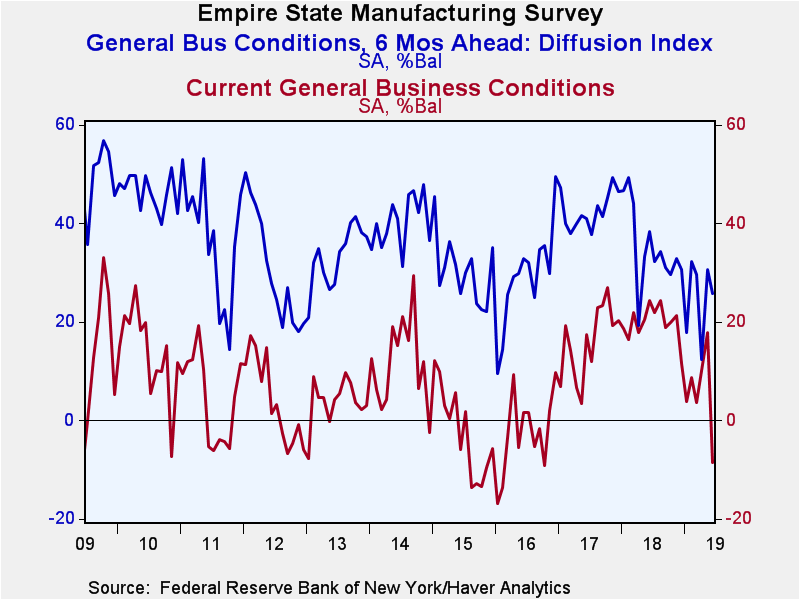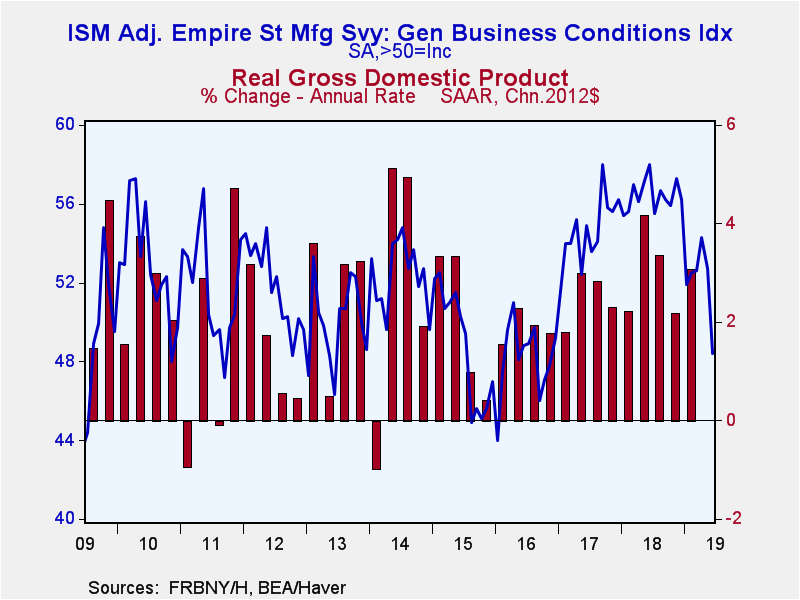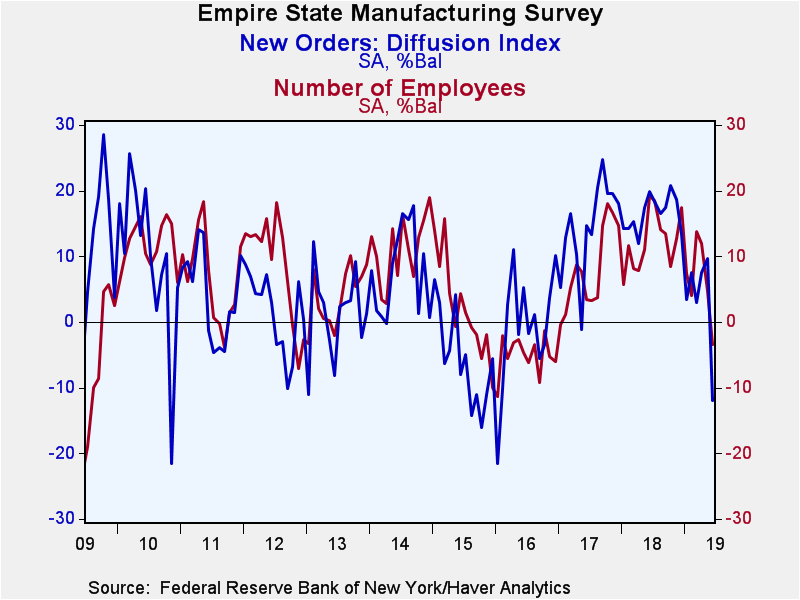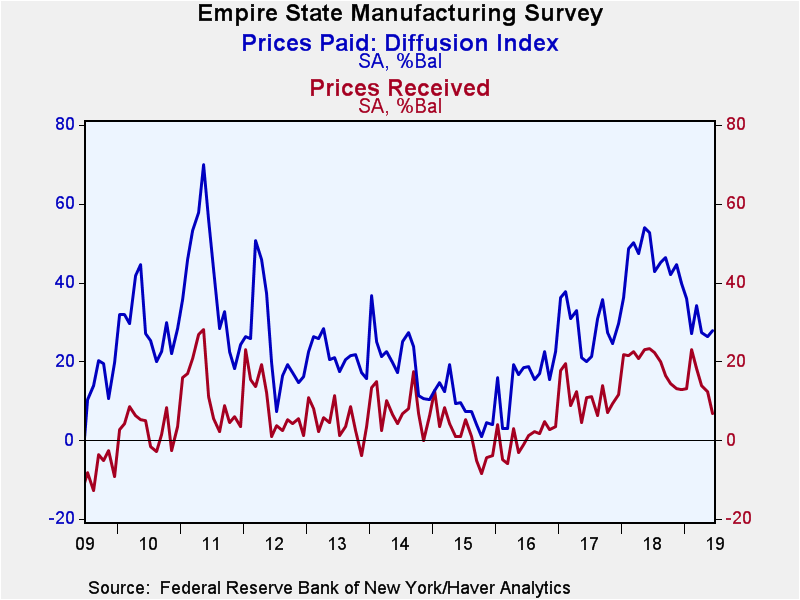 Global| Jun 17 2019
Global| Jun 17 2019Empire State Manufacturing Index Turns Negative
by:Tom Moeller
|in:Economy in Brief
Summary
The Empire State Manufacturing Index of General Business Conditions declined sharply to -8.6 during June, the first negative index level since October 2016. The Action Economics Forecast Survey expected a June reading of 10.5. The [...]
The Empire State Manufacturing Index of General Business Conditions declined sharply to -8.6 during June, the first negative index level since October 2016. The Action Economics Forecast Survey expected a June reading of 10.5. The Empire State data, reported by the Federal Reserve Bank of New York, reflect business conditions in New York, northern New Jersey and southern Connecticut.
Haver Analytics calculates a seasonally adjusted index that is comparable to the ISM series. The calculated figure fell to 48.4, the lowest level since November 2016. During the last ten years, there has been a 42% correlation between the index level and the quarter-to-quarter change in real GDP.
Movement amongst the sub-series was mostly downward. The new orders index turned negative and reversed improvement during the prior two months. The shipments reading also deteriorated moderately. The unfilled orders measure cratered to the lowest level since December 2015. The inventories index eased further into negative territory, indicating continued inventory liquidation. The vendor delivery series fell sharply and indicated the quickest product delivery speeds since January 2017.
The employment index declined and was negative for the first time since January 2017. A sharply lessened 12% of respondents reported higher employment, while an increased 15% showed a decrease. During the last ten years, there has been a 49% correlation between the employment index and the month-to-month change in factory sector payrolls. The employee workweek reading also fell into negative territory, indicating a shorter workweek, and was down sharply from its high reached last April.
The prices paid index improved slightly, but remained down sharply versus its high in May 2018. Thirty-two percent of respondents indicated increased prices this month while five percent reported a decrease. The prices received index fell to the lowest point since August 2017.
The series measuring expectations for business conditions in six months eased m/m. Most component series deteriorated including new orders, shipments, unfilled orders, employment & delivery times. The capital spending intentions index declined sharply to the lowest level since September 2017.
The Empire State figures are diffusion indexes, which are calculated by subtracting the percent of respondents reporting declines from those reporting gains. The data are available in Haver's SURVEYS database. The ISM-adjusted headline index dates back to 2001. The Action Economics Forecasts can be found in Haver's AS1REPNA database.
| Empire State Manufacturing Survey | Jun | May | Apr | Jun'18 | 2018 | 2017 | 2016 |
|---|---|---|---|---|---|---|---|
| General Business Conditions (Diffusion Index, %, SA) | -8.6 | 17.8 | 10.1 | 24.4 | 19.8 | 16.1 | -2.6 |
| General Business Conditions Index (ISM Adjusted, >50=Increasing Activity, SA) | 48.4 | 52.7 | 54.3 | 58.0 | 56.4 | 54.6 | 48.1 |
| New Orders | -12.0 | 9.7 | 7.5 | 19.8 | 16.5 | 14.5 | -0.9 |
| Shipments | 9.7 | 16.3 | 8.6 | 22.3 | 20.4 | 15.9 | 1.9 |
| Unfilled Orders | -15.8 | 2.1 | -0.7 | 9.3 | 3.5 | 1.9 | -8.8 |
| Delivery Time | -4.5 | 0.7 | 7.0 | 13.2 | 9.1 | 6.1 | -4.8 |
| Inventories | -4.3 | -4.1 | 8.4 | 5.4 | 5.9 | 1.5 | -9.6 |
| Number of Employees | -3.5 | 4.7 | 11.9 | 19.2 | 12.4 | 8.1 | -5.1 |
| Average Employee Workweek | -2.2 | 4.4 | 4.3 | 11.1 | 7.8 | 4.6 | -5.1 |
| Prices Paid | 27.8 | 26.2 | 27.3 | 52.7 | 45.8 | 29.0 | 15.7 |
| Prices Received | 6.8 | 12.4 | 14.0 | 23.3 | 19.3 | 11.0 | 0.7 |
| Expectations 6 Months Ahead | 25.7 | 30.6 | 12.4 | 38.3 | 35.2 | 42.7 | 29.0 |
Tom Moeller
AuthorMore in Author Profile »Prior to joining Haver Analytics in 2000, Mr. Moeller worked as the Economist at Chancellor Capital Management from 1985 to 1999. There, he developed comprehensive economic forecasts and interpreted economic data for equity and fixed income portfolio managers. Also at Chancellor, Mr. Moeller worked as an equity analyst and was responsible for researching and rating companies in the economically sensitive automobile and housing industries for investment in Chancellor’s equity portfolio. Prior to joining Chancellor, Mr. Moeller was an Economist at Citibank from 1979 to 1984. He also analyzed pricing behavior in the metals industry for the Council on Wage and Price Stability in Washington, D.C. In 1999, Mr. Moeller received the award for most accurate forecast from the Forecasters' Club of New York. From 1990 to 1992 he was President of the New York Association for Business Economists. Mr. Moeller earned an M.B.A. in Finance from Fordham University, where he graduated in 1987. He holds a Bachelor of Arts in Economics from George Washington University.
More Economy in Brief
 Global| Feb 05 2026
Global| Feb 05 2026Charts of the Week: Balanced Policy, Resilient Data and AI Narratives
by:Andrew Cates










